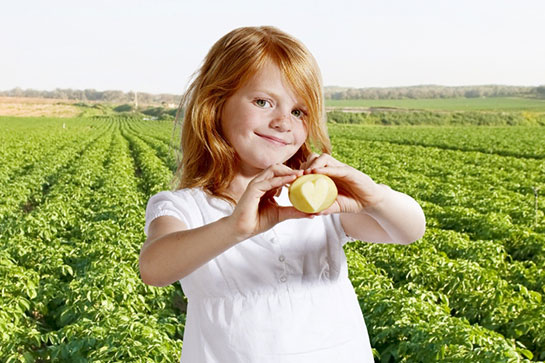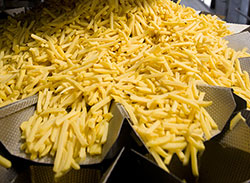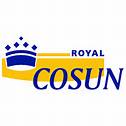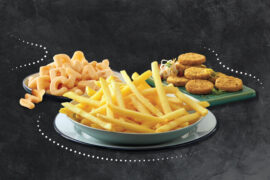After a challenging first half of 2013, Aviko BV turned the tide during the second half and ended the year with a positive result, according to the annual report just posted by parent company Royal Cosun. The upswing is expected to continue into the early months of 2014.
Steenderen, Holland-headquartered Aviko, which ranks as the world’s fourth biggest packer of frozen potato products and largest supplier of chilled french fries, had to cope with high raw material prices due to poor harvest yields in 2012 in combination with a disappointing growing season in 2013. This led to strong pressure on margins and underutilization at the company’s factories.

Meanwhile, it was announced on January 22 by the Flanders Investment and Trade office that Aviko is seriously thinking about building a new factory to produce french fries in the West Flanders region of Belgium. Operations in and around the plant could potentially create 120 to 150 jobs.
Aviko has signed an option agreement to purchase 6.4 hectares of industrial land in Poperinge. The company still has to file the necessary licenses and permits to comply with construction and environmental laws but, according to Poperinge Mayor Christof Dejaegher, this should not pose any problems.
 “We’re excited about Aviko’s interest in our town,” said Dejaegher. “The company contacted us about this potential investment because Poperinge, along with the surrounding Westhoek area, is an excellent region for growing potatoes.”
“We’re excited about Aviko’s interest in our town,” said Dejaegher. “The company contacted us about this potential investment because Poperinge, along with the surrounding Westhoek area, is an excellent region for growing potatoes.”
A number of other potato processors are already active in the neighborhood, among them Clarebout Potatoes in Heuvelland and Bart’s Potato Company in Vleteren.
Elsewhere in Europe, Aviko reported reaching an agreement to acquire a majority stake in Amberger on January 15. This Bavarian family firm is a specialist in the production of fresh potato products for the foodservice market. The investment in Amberger will strengthen Aviko’s position in this segment in both Germany and Austria. The deal, which is subject to approval by German regulators, adds a broad range of potato specialties to its range.
Oberdolling-based Amberger regards Aviko’s participation as an investment in the continuity and future growth of its business. Martin and Wolfram Amberger will continue to be in charge of day-to-day management of the operation.
 Now let’s get back to the overall performance by Aviko’s parent company in 2013. On February 13 outgoing Chairman Jos van Campen reported that Royal Cosun group sales topped the EUR 2 billion mark for the first time ever. Almost every business unit generated revenue increases over the previous year, due to higher selling prices, organic growth and a number of acquisitions.
Now let’s get back to the overall performance by Aviko’s parent company in 2013. On February 13 outgoing Chairman Jos van Campen reported that Royal Cosun group sales topped the EUR 2 billion mark for the first time ever. Almost every business unit generated revenue increases over the previous year, due to higher selling prices, organic growth and a number of acquisitions.
The primary business of the Breda, Holland-headquartered agri-industrial conglomerate is not potatoes, but sugar.
“We are a cooperative of sugar beet growers,” said Van Campen. “Our mission is to earn the highest possible financial yield per hectare of sugar beet. We again succeeded in this following the excellent result in 2012. Our ambition is to continue earning a profitable yield per hectare, after the end of the common sugar market organization in 2017.”
At EUR 2.2 billion, consolidated turnover was 11% higher than in 2012 (EUR 1.9 billion). Cosun’s operating profit remained at a high level, EUR 175 million versus EUR 193 million in 2012, even though beet payments to members were higher. With lower taxes and finance expenses, net profit for 2013 is projected at EUR 139 million (compared with EUR 138 million in 2012).
At Suiker Unie (sugar) turnover was lifted by higher sales. Despite declining sugar prices on the world market, the result remained at a good level, thanks in part to a large proportion of the 2013 turnover being achieved on contracts concluded in 2012. Prices on the world market weakened in 2013 and the European Commission took measures to increase supply in the EU. The outcome was a sharp drop in prices at the end of 2013. Contract prices for 2014 are lower than those for 2013, and Suiker Unie’s result for 2014 will be accordingly lower.
Sensus (inulin) turned in a good result for 2013. It reported an increase in sales, among other sectors in the baby food industry in Asia. Demand for inulin as a functional food ingredient for health-conscious consumers is still growing, especially in Asia and the United States.
SVZ (fruit and vegetable purees and concentrates) sustained the upward line in 2013. Its operating profit was higher and its product range is less sensitive to strong prices fluctuations. Growth was derived chiefly from sales of vegetable purees for baby food. The factory in the Netherlands was closed in mid-2013, while activities in the US developed positively.
Duynie (animal feed and starch applications) was strengthened in mid-2013 with the acquisition of Beuker. The animal feed activities of Jan Bakker were acquired at the end of the year. Both the size and the turnover of the Duynie group have therefore increased sharply. Results on animal feed activities were in line with those for 2012. The starch business, however, went through a difficult time in the face of fierce competition.





